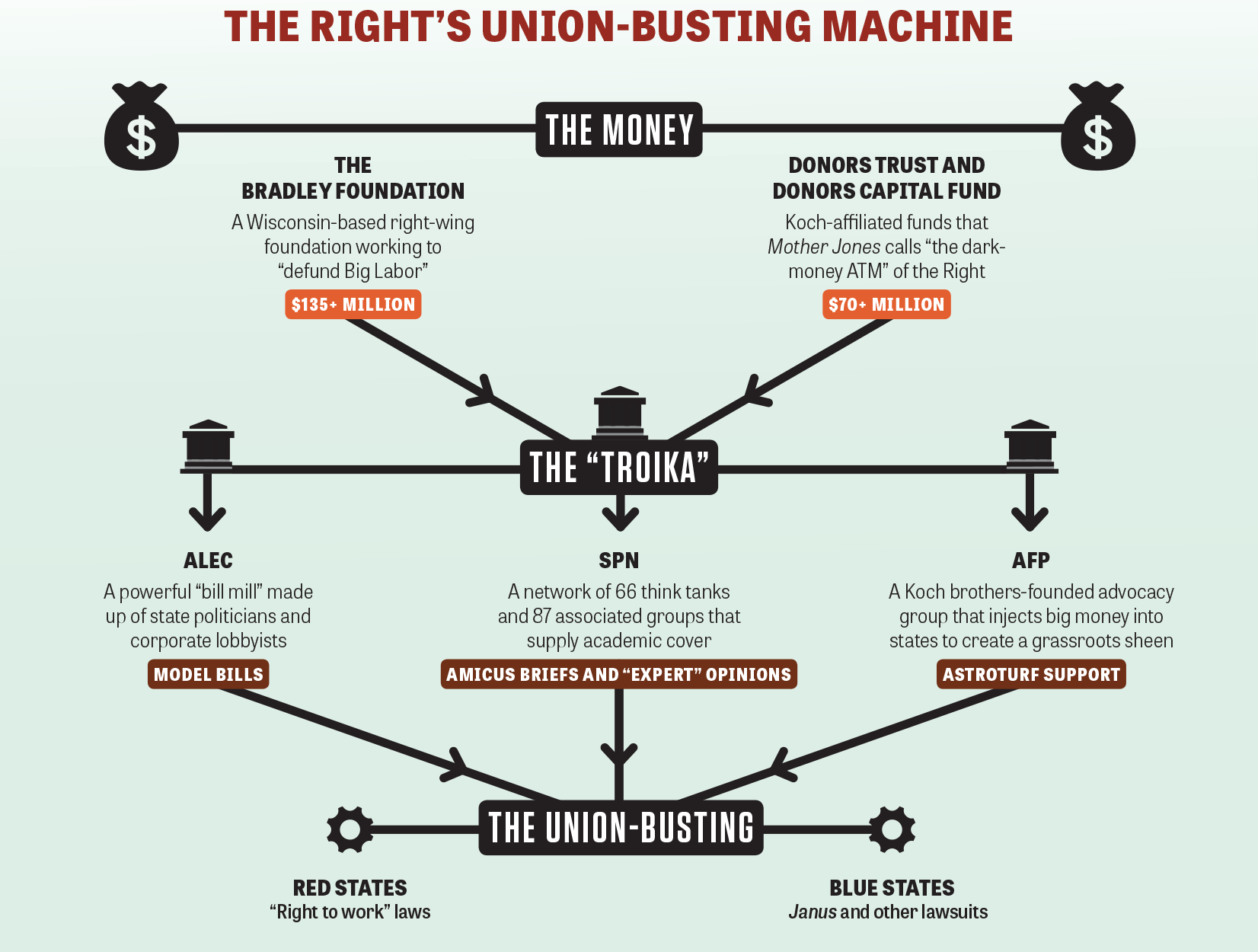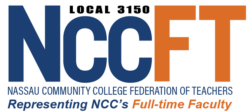In our last post, we shared this graphic with you from Mary Bottari’s In These Times article, “Behind Janus: Documents Reveal Decade-Long Plot to Kill Public-Sector Unions:”

Notice that the bottom branches of this tree define two very different strategies for union busting, depending on whether the state in question is red or blue. Indeed, one of the reasons ALEC, SPN, and AFP have been so successful is that they have very carefully calibrated their strategies on a state-by-state basis. They do this, in part, by making sure SPN has an affiliate and/or associate member in each state,[1] for example the Albany-based Empire Center for Public Policy (ECPP). ECPP bills itself as, an “independent, non-partisan non-profit think tank,” whose mission is to “make New York a better place to live and work by promoting public policy reforms grounded in free-market principles, personal responsibility, and the ideals of effective and accountable government.” A closer look, however, reveals both how deeply embedded ECPP is in the union-busting coalition illustrated in the above graphic and why NYSUT is central to any successful strategy for thwarting that coalition’s agenda.
To start, ECPP is a project of the Manhattan Institute for Policy Research (MIPR), a right-wing non-profit with ties to the Koch brothers. MIPR is an associate member of SPN, with connections to ALEC, whose role, you’ll remember, is to write cookie-cutter legislation that turns the right’s ideological and policy positions into law. ECPP also hosts writers from the Franklin Center for Government and Public Integrity, which has received funding from the Koch brothers, is connected to both the Bradley Foundation and ALEC, and sends partisan, right-wing journalists out to cover government issues in an attempt to shape public opinion in the right’s favor. In a very practical, concrete way, in other words, ECPP represents the tip of a remarkably well-funded iceberg, one we could find ourselves crashing into if we are not very well prepared.
To put this another way, even though ECPP does not have the power to threaten New York State public employee union contracts or labor protections directly, the organization nonetheless represents, simply by its existence, a state-level threat that we have to take very seriously. Take another look at the above graphic. Look again as well at the list of organizations supporting the Janus plaintiffs and how much money they’ve received. That level of funding is potentially available to ECPP through its connection to SPN, ALEC, the Koch brothers and the Bradley Foundation. In fact, ECPP received in 2016 a $50,000 grant from the Bradley Foundation to support its general operations. This is how the Center for Media and Democracy described the grant:
If distributed, this will be the first Bradley grant to the Empire Center for Public Policy (ECPP). According to the grant proposal record, Bradley wants to fund ECPP to bust unions in New York using tactics the Freedom Foundation has employed in Washington and Oregon. ECPP will use Bradley funds to encourage day care workers to drop out of unions and stop [paying] dues.
And this is a direct quote from what the Bradley Foundation’s staff had to say in support of the grant itself (from the same web page linked to above):
Empire is willing to learn from and seems to have the stomach for implementing the overall strategies and confrontational tactics of the Freedom Foundation in pursuing Bradley’s programmatic employee rights goals – in a state that matters, given its government unions’ funding of the Left, its causes, and its other organizations nationally.
According to this 2016 article in The Guardian, the Freedom Foundation’s “confrontational tactics” have included dispatching activists “to visit the homes of more than 10,000 childcare and home-care workers in Washington and Oregon to advise them that under a two-year-old supreme court decision, they [could] opt out of paying union dues.” It has also made “public records requests to numerous counties to obtain the names and addresses of home-care and childcare aides.” As we reported to you in this post, those are both tactics the Foundation has already started using in New York State on members of CSEA and NYSUT. In addition, the Freedom Foundation “does podcasts that rail against unions and sponsors a website, optouttoday.com, telling public-sector workers they can quit their unions.”
As of 2016, the Freedom Foundation had received a total of $2,340,500 from the Bradley Foundation, demonstrating just how highly the latter values “confrontational tactics” when they are successfully deployed. In this light, it’s clear that the $50,000 the Bradley Foundation gave to ECPP is a test, and we can only assume that if ECPP shows promise in becoming a union-busting force-to-be-reckoned-with, then that funding could very quickly and very easily grow into the millions.
Fortunately for us, that promise has not yet been fully realized. More to the point, though, in the reports and position papers ECPP puts out, the organization consistently names NYSUT as perhaps the single biggest obstacle to achieving the right’s union-busting goals in our state. In a report titled “Janus Stakes”, for example, using data from the Joint Commission on Public Ethics (JCOPE), ECPP points out that NYSUT and three of its affiliates–New York City’s United Federation of Teachers (UFT), SUNY’s United University Professions (UUP), and CUNY’s Professional Staff Congress (PSC)–contributed more than half ($23 million) of all government union lobbying funds between 2013 and 2016. NYSUT’s share of that amount came to $11.7 million (13–14), an amount far beyond the means of any single local to raise.
Consider the anti-Janus union protections that were added to the Taylor Law as part of this year’s budget. We can assume those changes were not unopposed; and we should assume that this opposition had a significant amount of money behind it. It’s possible of course that the other public sector unions in New York State could on their own have persuaded the state legislature to pass those protections, but it would be naïve at best to assume that the money and influence NYSUT brought to the table–including the nearly $860,000 it spent on lobbying in the first half of 2017–did not seriously tip the scales in our favor.
The work NYSUT does on our behalf may not be visible in the way that the job actions taken by the teachers in West Virginia, Kentucky, Oklahoma, Colorado, and Arizona were (and are), but the results NYSUT achieves are no less crucial in maintaining the health of organized labor in New York State. As a member of NYSUT, the NCCFT pays its fair share towards funding these efforts, as do those of us who make voluntary contributions to VOTE-COPE. In the next post, we’re going to dig a little deeper into some of the work NYSUT has done, and continues to do, on our behalf.
- According to The Center for Media and Democracy’s Sourcewatch, the difference between an associate member, like the Manhattan Institute for Policy Research, and an affiliate member of SPN, like the Empire Center for Public Policy, was explained on the 2011 version of SPN’s website in this way: Affiliate Members: “A regular member operates as a full-service think tank, addressing a variety of relevant policy issues, not just a single-issue. They will operate independently with their state, and not as part of a state chapter, franchise, other effort of a separate organization. Their primary goal is to provide educational materials to the citizenry, public officials, and members of the media with a state-based focus. They refuse to accept or solicit government funding, and are IRS approved 501(c)(3)s.” Associate Members: “Like regular members, associate members are organizations that display a commitment to a market-oriented foundational public policy. They are also IRS approved 501(c)(3) organizations primarily focused on education and operate independently of all government funding. However, unlike regular members, SPN Associate Members can be national in scope and are not necessarily oriented towards a single state.” ↩

2 Responses
Thank you for these informative posts, which have relevance beyond any single campus.
Did the NCCFT write this blog? Let me advise you (regardless of who wrote it) that using phrases like “Why does this money and the political influence it buys matter so much?” is inadvisable. It is illegal to “buy” political influence. Since we (meaning unions) are under attack and scrutiny please be careful when you speak and write.